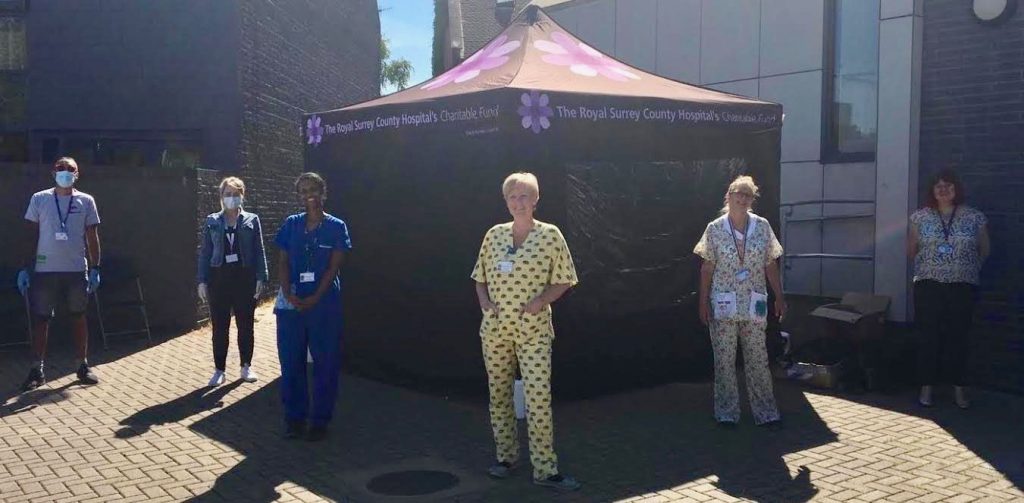 Abraham Lincoln
If given the truth, the people can be depended upon to meet any national crisis...
Abraham Lincoln
If given the truth, the people can be depended upon to meet any national crisis...
 Guildford news...
for Guildford people, brought to you by Guildford reporters - Guildford's own news service
Guildford news...
for Guildford people, brought to you by Guildford reporters - Guildford's own news service
Royal Surrey’s Pop-up Clinics Bring Health For the Homeless
Published on: 24 Jun, 2020
Updated on: 27 Jun, 2020
Royal Surrey pop-up clinics in Guildford and Woking areas are providing life-saving healthcare to the homeless during the Covid-19 pandemic.
The innovative outreach project has been launched by clinicians at the Royal Surrey County Hospital to screen and treat the local homeless community for hepatitis C and liver damage. Historically, homeless people are at a much higher risk of contracting hepatitis C, a blood-borne virus that can cause liver damage, as well as being less likely to access essential healthcare.
Due to the pandemic, homeless people across Surrey have been housed, giving clinicians much-needed access to them. Royal Surrey doctors and nurses are working with the Hepatitis C Trust to set up this potentially life-saving service. So far, the team has screened more than 100 patients for hepatitis C and liver damage, treating those who need it.
Romanie Westwood, a clinical nurse specialist for the Trust who has been providing this service, said: “Hepatitis C can cause many serious health problems and although the prevalence of this disease in the general Surrey population is relatively low, the risk of hepatitis C to the homeless population can be up 20 times higher.
“The project has been hugely rewarding in a time where everything feels quite bleak.”
Rachel Halford, chief executive officer of the Hepatitis C Trust, said: “In what has been the most extraordinary and difficult of times for many, it has been fantastic to turn restriction into something positive. By working alongside the pop-up clinics, our peer support workers have been able to reach and support some of the most marginalised and hardest to engage people in our society.
“This has been a unique window of opportunity where we have been able to provide education and awareness about hepatitis C to stop transmission and support those who have been diagnosed to access the short course of treatment needed to cure it.”
The pop-up clinics will continue for the foreseeable future.
Recent Articles
- Guildford Institute’s Crowdfunding Project for Accessible Toilet in its New Community and Wellbeing Centre
- Letter: Guildford – Another Opportunity Missed?
- Letter: GBC’s Corporate Strategy – Where Is the Ambition?
- My Memories of John Mayall at a Ground-breaking Gig in Guildford Nearly Six Decades Ago
- Westborough HMO Plans ‘Losing the Heart of the Street’ Says Resident
- College Invests to Boost Surrey’s Economy and Close Digital Skills Gap
- Community Lottery Brings Big Wins for Local Charities
- GBC Housing Plan Promises ‘A Vibrant Urban Neighbourhood’ Near Town Centre
- Hospital Pillows ‘Shortage’ at the Royal Surrey
- Updated: Caravans Set Up Camp at Ash Manor School


Search in Site
Media Gallery
Dragon Interview: Local Artist Leaves Her Mark At One of England’s Most Historic Buildings
January 21, 2023 / No Comment / Read MoreDragon Interview: Lib Dem Planning Chair: ‘Current Policy Doesn’t Work for Local People’
January 19, 2023 / No Comment / Read MoreA3 Tunnel in Guildford ‘Necessary’ for New Homes, Says Guildford’s MP
January 10, 2023 / No Comment / Read More‘Madness’ for London Road Scheme to Go Ahead Against ‘Huge Opposition’, Says SCC Leader
January 6, 2023 / No Comment / Read MoreCouncillor’s Son Starts Campaign for More Consultation on North Street Plan
December 30, 2022 / No Comment / Read MoreCounty Council Climbs Down Over London Road Works – Further ‘Engagement’ Period Announced
December 14, 2022 / No Comment / Read MoreDragon Interview: GBC Reaction to the Government’s Expected Decision to Relax Housing Targets
December 7, 2022 / No Comment / Read MoreHow Can Our Town Centre Businesses Recover? Watch the Shop Front Debate
May 18, 2020 / No Comment / Read More










Recent Comments